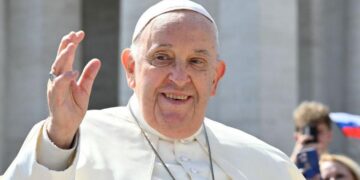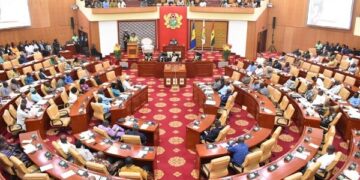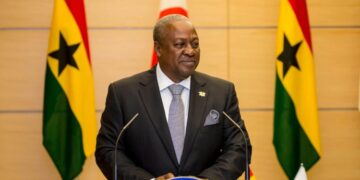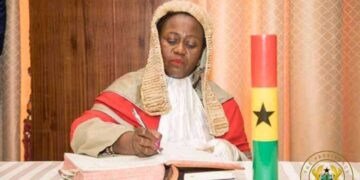In the last of my four-part series on ‘What I Observe For December 7’, I want to focus on one of the reasons I believe has gotten many Ghanaians to revise their notes, which is the meaning of “change.”
We will automatically be voting for a leadership change on Saturday because President Akufo-Addo’s two constitutional terms come to an end.
But, even those calling for change are reflecting on what that means. Which of the two main candidates, Vice President Mahamudu Bawumia and former President John Dramani Mahama, represents real change?
Does change mean going back to vote for the person you tried and tested and hastened to massively change in 2016? Has he done anything to show you he has changed? Are his shouts of corruption to be taken to mean his own personal integrity profile has changed for the better?
Or will vote for the one who has never been president before not rather represent real change? That is a change for someone new. Not change to go back to the one who was changed.
Bawumia has proven himself to be the man who has implemented change for Ghana, as Vice President, in the areas his boss gave him space to operate. He is the man who is promising to change Ghana by offering new, durable solutions to our old, enduring problems. The man who has the vision to take Ghana firmly into the evolving global marketplace, developing the youth and the economy to compete effectively in the new world of work and trade!
It is easier to be excited by imagining what a Bawumia presidency will mean for Ghana than what a return to John Mahama will look like. The rate at which the world is changing, if Ghana is not deliberate over the next five years in embracing and prioritising digitalisation we will lose out on the Fourth Industrial Revolution and with that the opportunities to find jobs for our young people and to compete and be seen as a worthwhile global business environment.
Bawumia’s pitch is that, yes, he will deliver on all that is expected of a Ghanaian leader: fix roads, build and equip schools, prioritise the health sector, invest in agriculture and security, etc. He is also promising business-friendly policies. He is saying you can trust him to find the money to protect and enhance Free SHS and Free TVET and also complete all 111 hospital facilities under Agenda 111, including new hospitals in 101 districts and seven new regional hospitals. These mean some 70,000 direct jobs for health workers.
Yes, his business-friendly policies are refreshing and can stimulate economic growth and create jobs in the private sector. But, the additional edge to what he brings is what makes his proposition superior and exciting. He knows where the millions of new jobs will be created for our youth and he knows how to get there! He is saying to you, the voter, that it is also possible for Ghana to have a president for the next four years who can lead Ghana fully into the Fourth Industrial Revolution.
The IFC—a member of the World Bank Group and the largest global development institution focused on the private sector in emerging markets — has a special report, “Digital Skills in Sub-Saharan Africa: Spotlight on Ghana”. It begins with a profound prediction that, “About 65 percent of children entering primary school today, according to one estimate, will end up working in a job that doesn’t yet exist. The World Bank Group’s Human Capital Project emphasises the need for economies to invest in human capital—particularly digital skills—or risk falling behind in the rapidly changing landscape for jobs and skills. Automation is challenging the traditional boundaries of firms and expanding global supply chains, which may enable rural clusters to emerge that connect small and medium-sized enterprises to opportunities worldwide.”
What this means is that, whether you are a farmer, taxi driver, pharmacist, dentist, photographer, trader, manufacturer, builder, or fashion designer, you will need technology to be competitive. So, the NPP’s focus on STEM education and Bawumia’s plans to train one million young Ghanaians in digital skills and support them to make a fantastic living from their skills is the way to go. His plan to set up a fintech fund with a $100 million seed capital and make Ghana the digital capital of AfCFTA is poised to put Ghana ahead in Africa’s fast-integrating single market of 1.4 billion consumers.
The IFC report also predicts that “Ghana alone will offer 9 million digital jobs and nearly $4 billion in revenue potential through 2030.” This stems from the belief that there is “substantial scope for the information and communication technology sector to grow amid continued demand for digital skills in the labour force.”
Indeed, the report makes a very bold forecast that the 9 million jobs requiring digital skills in 2030 will mean business-to-consumer opportunities for about 700,000 people who need digital skills through 2030 and $320 million in revenue. “Ghana could have business-to-business and business-to-government opportunities that reach about 18 million people who require digital skills through 2030 and nearly $3.5 billion in revenue,” it adds.
The IFC report further highlights the fact that the “market for digital skills across Sub-Saharan Africa and Ghana over the coming decade is significant. While transformation will come more quickly to the formal economy, the informal economy is also rapidly influenced by technology and citizens will feel the impact across agriculture, industry, and services.”
The trend has set, more than 40 per cent of skills required for the workforce are changing, with employers anticipating that more than half of employees need to learn different or more advanced skills in ICT.
I heard Dr Bawumia say in his address to the nation last night, December 5, that his vision is to see human resources (skilled and semi-skilled people) being a major export earner for Ghana. The digital economy means that you can operate from your computer in Nkawkaw and still earn dollars for providing services to a client in Helsinki, Finland.
I see no reason why young Ghanaians who are desperate for jobs will not invest their hopes in Bawumia. Indeed, to be trained for work in the digital space you do not need to be well educated. All you need is how to think and use your mobile handset to transform your life.
Now, let me look at the alternative, whom I am not convinced is plugged into what our young people need even as he promises to deliver ‘the Ghana we want’. Being the president who was voted out and returning to contest again is a very tough call and John Mahama deserves our sympathy. Whatever he says is juxtaposed against what he did when he had the power. Whatever he promises is compared to what he did not do when in office as President, and not as No. 2.
The more he explains it the more he exposes his “24 Hour Economy” as little more than a sexy slogan. He travels abroad to acknowledge the devastation wreaked on the Ghanaian economy by the global economic crisis and returns home to ridicule any reference to the situation in Ghana. However, in his last State of the Nation address on Thursday, 5 January 2017, John Mahama attributed his bad economic performance to a global economic crisis that many of us did not even know existed at the time!
He said, “Our world has become increasingly complex and unpredictable. The majority of economies around the world are sailing against strong headwinds. The world economic crisis and the slow-down in the growth of the Chinese economy have affected the growth of emerging markets… this is causing an adverse economic outlook for lower-middle-income economies like ours.” Perhaps, he was only prophesying.
He went on in that address to say that, when he was voted into office in 2013, he “inherited [from Mills] an economy that was running a high deficit, with increasing inflation and interest rates. It was also characterised by a rapidly depreciating currency.” That was the presidency he was a vice president in! But, under President Mills, the cedi depreciated by 36.5%, from $1 selling for GH¢1.24 in December 2008 to GH¢1.96 in December 2012. Under President John Mahama, it got even worse, when it fell by 54%, from GH¢1.96 to GH¢4.27.
Indeed, Ghana got worse after President Mahama took over after the death of President John Atta Mills. What is the guarantee that it would be better under a John Mahama comeback?
Let me conclude by painting the scenario I see after a Mahama comeback. We hope not to see what happened in 2009 when ordinary people were attacked in districts up and down the country because NDC had taken over and it was their turn to chop. In March 2009, I was part of a four-member fact-finding team, led by the late Jake Obestebi-Lamptey, with Hajia Rukiya Ahmed and the late Yaw Amfo Kwakye, to visit the victims of aggravated arson attacks in Tamale. We visited 18 burnt-down compound houses, which had 80 rooms destroyed, from attacks involving 200 assailants. https://www.modernghana.com/news/206392/npp-demands-end-to-impunity.html. Not a single arrest was made. The crime of the victims was that they were not NDC. One mother was attacked with a machete by a person she knew very well, who left her for dead and she had to be airlifted for treatment at the 37 Military Hospital. Her crime? He husband was a NADMO Coordinator under President Kufuor.
They seized management of public toilets and other public facilities in districts across the country and attacked their own leaders for not employing them fast enough! They threw out 108 employees under NYEP (now YEA). They harassed some people in the security forces as “party police” etc. As if that was not enough, they started attacking offices of state institutions to take over even from Prof Mills’ own appointees!
This is the choice that confronts Ghanaians on Saturday. I can foresee a rush to get new contracts awarded at a period where fiscal space is very limited. What would that mean to ongoing projects? Would Free SHS still remain or be reduced to a means-tested formula, vulnerable to discretionary abuse? Would they find the estimated $1.4 billion required to complete Agenda 111 or invest that in new projects and contracts which they would award?
What would his cabinet look like? I can tell you that with no succession plan in place, half of the cabinet will be more interested in preparing themselves for the succession battle which begins soon after his first cabinet meeting. With only one term, every appointee would know that they only have, at best, four years guaranteed. What then would be their priority? What would their internal succession struggle do to cohesion in the heart of government? So, you may ask, when would they find the space and time to focus on you, the ordinary Ghanaian under a John Mahama government?
Vote wisely and let us all endeavour to keep this race free, fair and peaceful. Ghana must win no matter who wins!






















































































